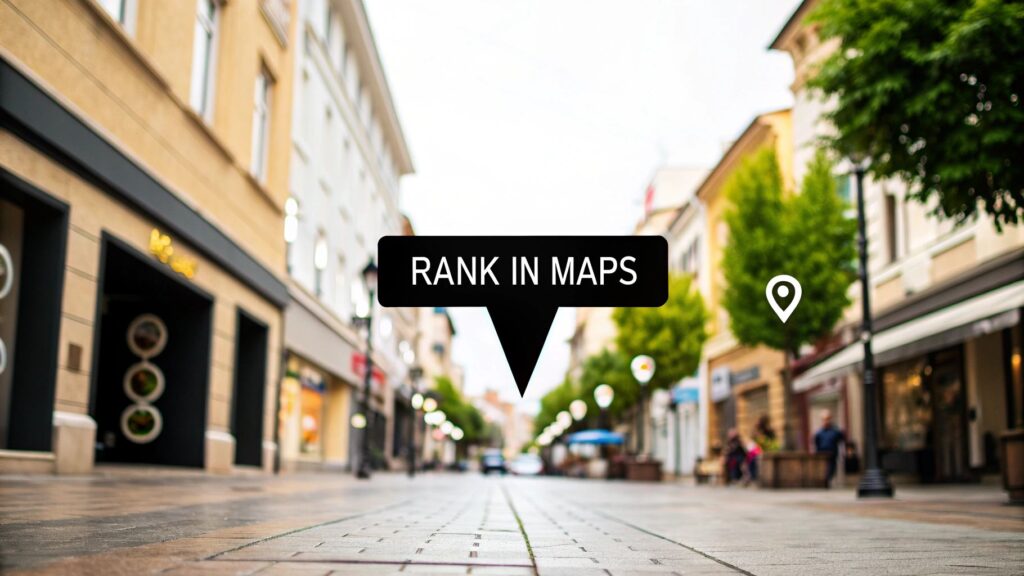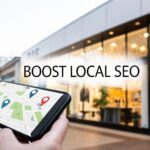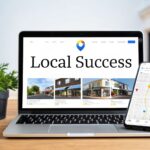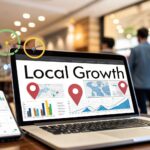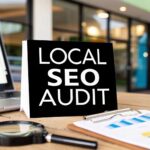Have you ever wondered how some local businesses pop up right at the top of Google Maps? It’s not magic; it’s local maps SEO. This is all about making your business visible to capture customers who are searching for your services right now, in your area.
When someone searches "plumber near me," showing up in the Google "map pack" can mean a new customer. If you don't appear, it's a missed chance. This guide provides a clear, step-by-step plan to help you win at local search.
In Short: This article explains the 8 key steps to improve your local maps SEO, helping you attract more nearby customers.
Each step is part of a larger system. Understanding how local maps SEO fits into broader local business marketing strategies is key for long-term growth. Let's get started.
People Also Ask
- How do I get my business to show up on local maps? To show up on local maps, you need a fully optimized Google Business Profile, consistent business information (Name, Address, Phone) across the web, and positive customer reviews.
- What is the most important factor in local SEO? Your Google Business Profile is the single most important factor. It's the main source of information Google uses to rank businesses in local search and map results.
- How can I improve my local map ranking? Improve your ranking by completely filling out your Google Business Profile, getting more positive reviews, building local citations, and creating content that is specific to your service area.
1. Google Business Profile Optimization
Your Google Business Profile (GBP) is like the front door to your business online. It's the most important part of any local maps SEO strategy. Google uses your GBP to decide where to rank you in the local map pack.
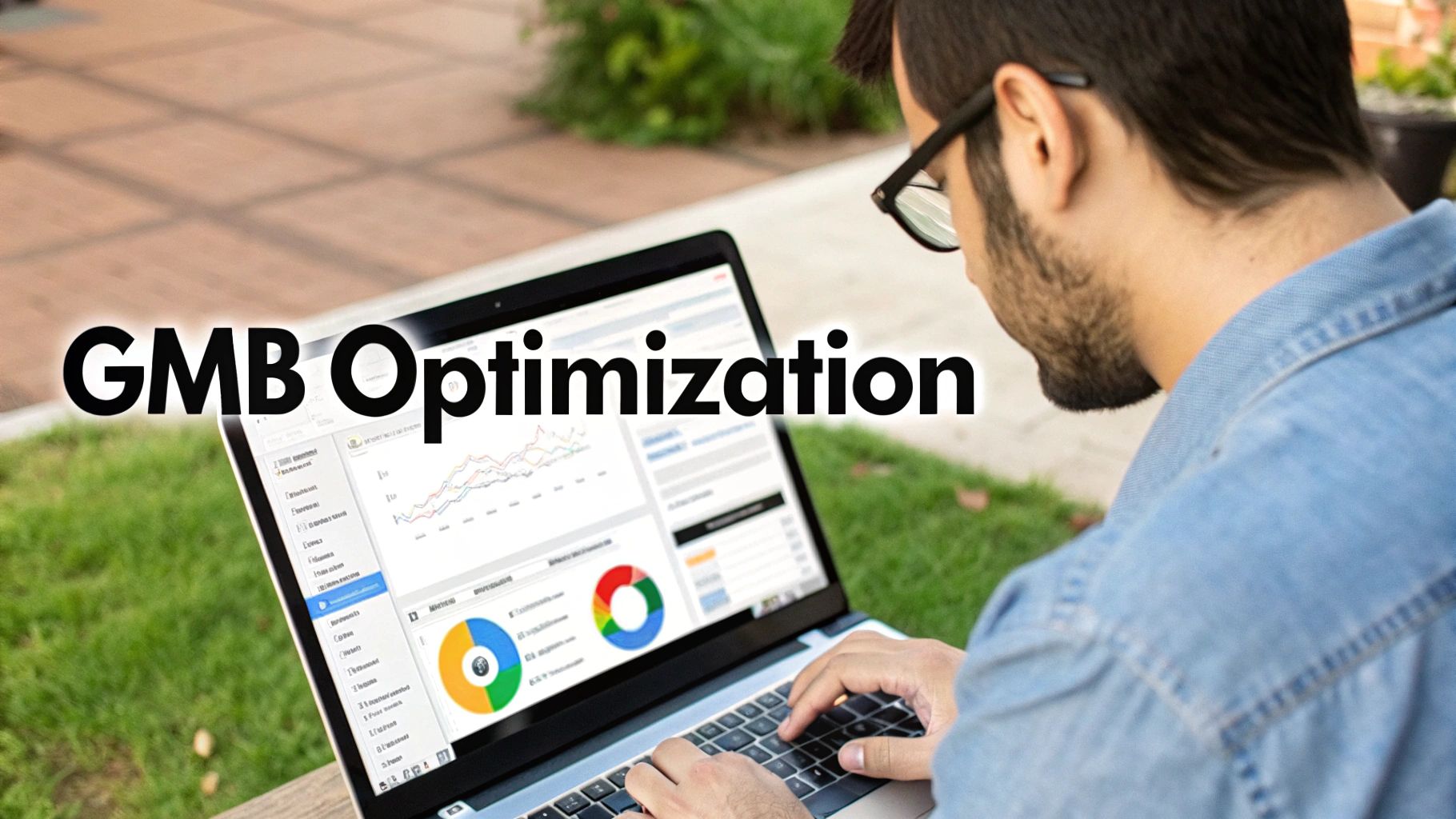
Optimizing your profile means more than just creating it. You need to claim, verify, and fill out every single section. It's an ongoing task that shows Google your business is active and trustworthy.
Actionable Optimization Tips
To make your profile work for you, follow these steps:
- Complete Every Field: Fill in everything. Add your services, products, hours, and other details. The more info you give, the better Google can match you to searches.
- Use High-Quality Photos & Videos: Regularly upload new photos of your shop, team, and work. A contractor can build trust by showing before-and-after project photos.
- Leverage Google Posts: Use Google Posts weekly to share updates or special offers. A local cafe could post a "drink of the week" to bring in customers.
- Engage with Reviews: Respond to all reviews, good and bad. This shows potential customers that you care about their experience.
In Short: Keep your Google Business Profile complete and updated to send strong ranking signals and boost your visibility in local search.
2. Local Citation Building and NAP Consistency
If your GBP is the front door, local citations are the signs around town pointing to it. A citation is any online mention of your business's Name, Address, and Phone number (NAP).
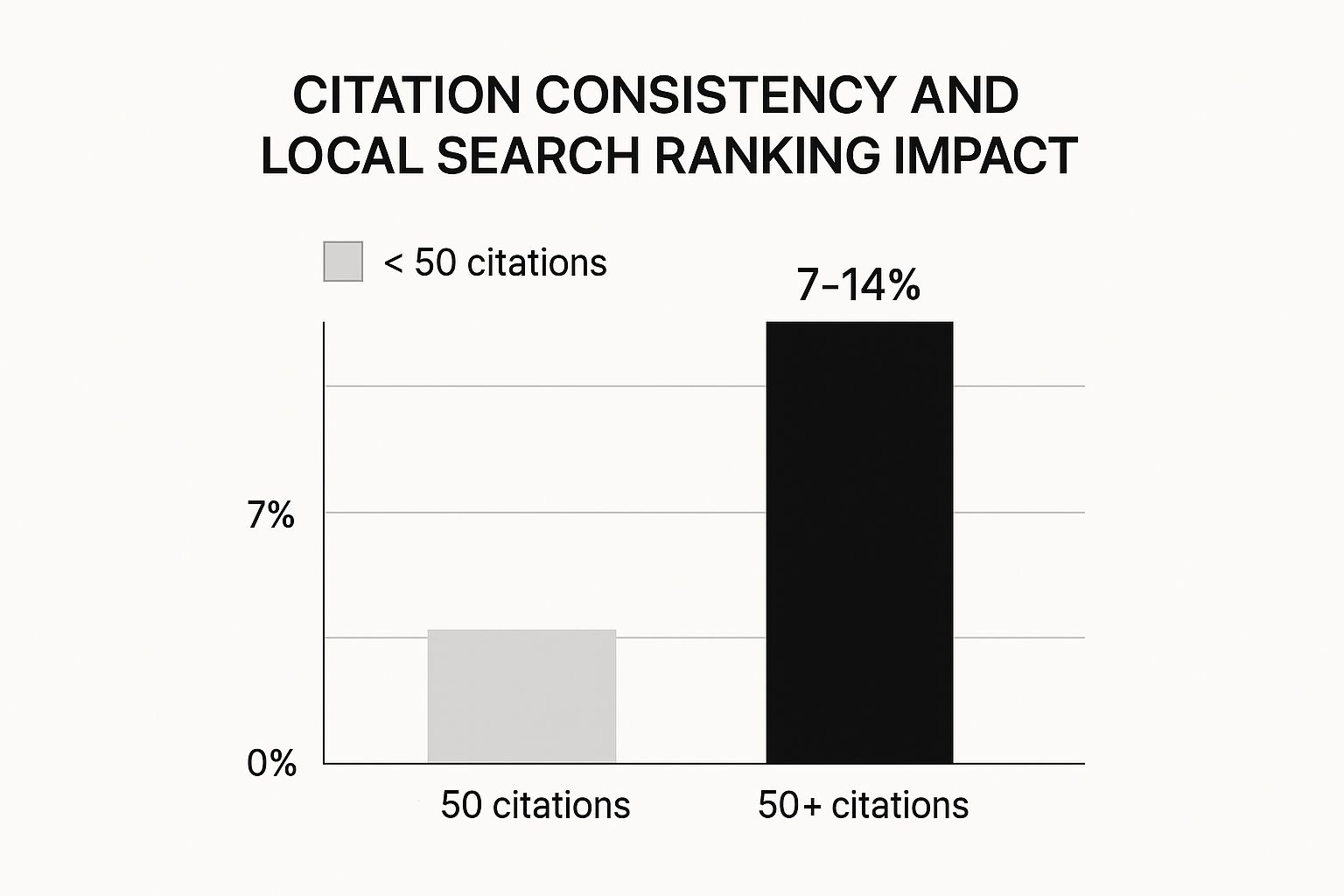
Having consistent, accurate NAP information across websites like Yelp, Apple Maps, and local directories is crucial. It verifies your business's location and builds trust with Google, which is fundamental for good local maps SEO. Any inconsistency can create confusion and hurt your rankings.
Actionable Optimization Tips
To build a strong citation profile, focus on these actions:
- Audit and Claim First: Before you build new listings, search for your business online. Claim any existing profiles and fix any wrong information.
- Establish a Master NAP: Decide on one exact format for your Name, Address, and Phone number. Use it everywhere. For instance, choose between "Street" and "St." and stick to it.
- Prioritize Core and Niche Directories: Start with big directories like Yelp and Facebook. Then, find sites specific to your industry. A mechanic should be on RepairPal, for example.
- Monitor Your Citations: Use a tool to track your citations. This helps you find and fix any new errors quickly.
In Short: Make sure your business name, address, and phone number are identical everywhere online to build trust with Google.
3. Localized Content Marketing
Good local maps SEO goes beyond your Google profile. The content on your website matters, too. Localized content is created specifically for your community. It answers local questions and shows that you are a true local expert.

This strategy helps you attract a very relevant audience. When you create content that solves local problems, you build trust and send strong signals to Google about your geographic relevance. This directly helps your map rankings.
Actionable Optimization Tips
Turn your website into a local resource with these ideas:
- Create Neighborhood-Specific Guides: A real estate agent could write guides for different neighborhoods, highlighting schools and parks to attract people looking to move.
- Address Local Problems & Seasonal Topics: An HVAC company in a cold climate could write a post on "How to Prepare Your Furnace for Winter." This is timely and useful.
- Cover Community Events & News: A local coffee shop can blog about farmers' markets or neighborhood festivals. This shows community involvement.
- Feature Local Case Studies: Showcase your work in the area. A roofer can post photos of a completed project in a specific suburb with a local testimonial.
In Short: Create content on your website that is specifically useful for people in your service area to establish yourself as a local authority.
4. Customer Review Management and Reputation Building
Customer reviews are the modern version of word-of-mouth. Managing them well is a key part of local maps SEO. Reviews are a huge trust signal for both customers and Google.
A steady stream of recent, positive reviews tells Google that your business is active and valued. This isn't just about waiting for good feedback. It's about actively asking for, monitoring, and responding to reviews.
Actionable Optimization Tips
Use customer feedback to boost your rankings and sales:
- Respond to All Reviews (Quickly): Reply to every review, good or bad. Thank happy customers and offer to help unhappy ones. This shows everyone you care.
- Systematize Your Requests: Don't just hope for reviews. Set up a simple system, like a follow-up email or text, to ask happy customers for feedback.
- Address Negativity Professionally: When a negative review comes in, respond with empathy. Offer to solve the problem offline. This shows accountability.
- Leverage Positive Feedback: Share your best reviews on your website and social media. This turns customer praise into free marketing.
In Short: Actively encourage and respond to customer reviews to build trust and provide Google with positive ranking signals.
5. Local Keyword Research and Optimization
Just targeting broad terms like "plumber" won't get you very far. Good local maps SEO means using the specific, location-based keywords your customers actually use. This is called local keyword research.
Local keywords include geographic terms ("in Chicago"), "near me" phrases, and even neighborhood names. This helps you connect with users who are ready to buy or book a service in your area.
Actionable Optimization Tips
Find the right terms to connect with nearby customers:
- Think Like a Local: Go beyond your city. Include neighborhoods, local landmarks, or even regional slang. A photographer could target "downtown Austin wedding photos."
- Analyze "Near Me" Searches: People often search for services "near me." Include these phrases naturally in your website content and GBP.
- Use Professional Tools: Use tools like Google's Keyword Planner (with location filters) to see what your competitors rank for. Learn more about how to keyword research effectively.
- Create Hyper-Local Content: If you serve multiple towns, create a separate page on your website for each one. This helps you rank in all the areas you serve.
In Short: Find and use location-specific keywords to attract high-intent customers searching in your service area.
6. Local Link Building and Community Partnerships
What happens off your website is also important. Local link building is getting links from other reputable websites in your community. These links are like "votes of confidence" that tell Google you are a trusted local business.
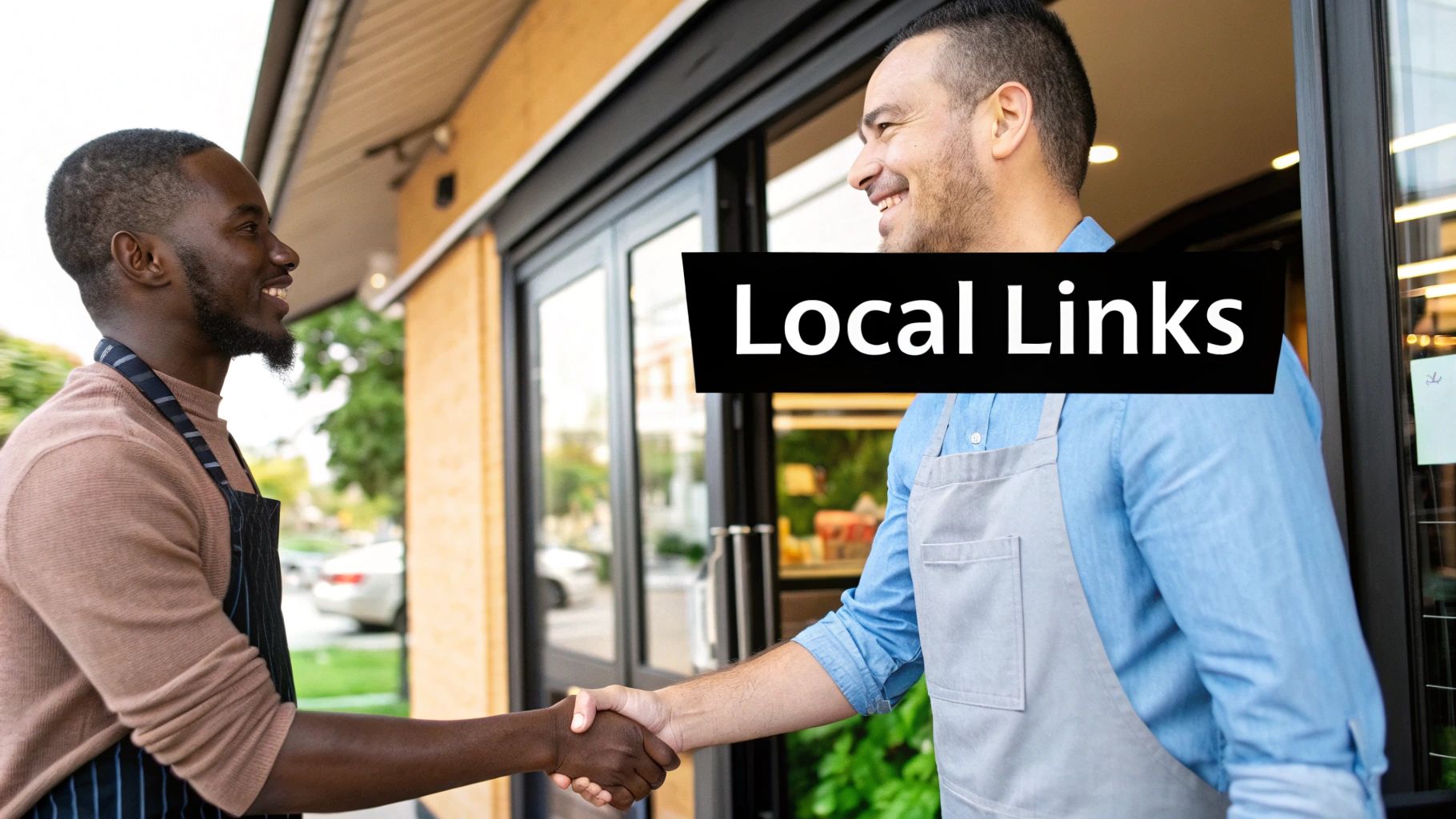
Think of it as building your online reputation. A link from a local news site, a popular blog, or the Chamber of Commerce passes authority to you. This strategy focuses on building real relationships that lead to these valuable links.
Actionable Optimization Tips
To build a strong local link profile, get involved in your community:
- Sponsor Local Events: Sponsor a local 5K run, festival, or school team. Sponsorships often come with a link from the event's website.
- Join Business Associations: Become a member of your local Chamber of Commerce. This usually includes a directory listing with a link.
- Forge Business Partnerships: Partner with other local businesses that don't compete with you. A plumber and an electrician could guest post on each other's blogs.
- Create Local-Centric Content: Make a useful resource, like a "Guide to Dog-Friendly Restaurants" in your town. Share it with local groups to earn links.
In Short: Earn links from other local websites by getting involved in your community to boost your site's authority.
7. Schema Markup and Technical Local SEO
Schema markup is code you add to your website that helps search engines understand your content. Think of it as speaking Google's language. For local maps SEO, this is a powerful tool.
Schema clearly defines your business address, hours, services, and reviews for Google. This technical step can lead to "rich snippets" in search results, like star ratings or event info. These eye-catching results can get you more clicks.
Actionable Optimization Tips
Use structured data to improve your local authority:
- Start with LocalBusiness Schema: This is the most important markup. Make sure you accurately list your name, address, phone number (NAP), and hours.
- Use Specific Schema Types: Be specific. A restaurant can use
Menuschema. A doctor's office can useMedicalClinicschema. - Implement Review Schema: This is a must. It allows Google to show your star rating directly in search results, building instant trust.
- Validate Your Code: Use a tool like Google's Rich Results Test to make sure your code is error-free.
In Short: Add schema markup to your website to help Google understand your business information, which can lead to better visibility in search results.
8. Multi-Location SEO Strategy
Managing a business with several locations adds a layer of complexity. You need a unique, local presence for each branch. This strategy helps each location compete effectively in its own market.
This means creating unique content for each location and managing separate Google Business Profiles. The goal is to treat each location as its own distinct entity. This is vital for chains, franchises, and service businesses with multiple branches.
Actionable Optimization Tips
To manage your brand across multiple locations, follow these steps:
- Create Unique Location Pages: Don't just copy and paste. Write unique content for each location page on your website. Include local staff info and directions.
- Optimize Individual GBP Listings: Each location needs its own fully optimized Google Business Profile with unique photos, posts, and review management.
- Build Location-Specific Citations: Get each branch listed in its own local directories and blogs.
- Maintain NAP Consistency: Ensure the Name, Address, and Phone number for each location is perfectly consistent on its GBP and website page.
In Short: For businesses with multiple locations, create a unique local strategy for each branch with its own GBP and website page.
Putting It All Together: Your Path to Local Dominance
We've covered the key parts of getting your business noticed in local search. From your Google Business Profile to local links, each piece matters. Mastering local maps SEO is a marathon, not a sprint.
It’s about building a system where every element works together. A great GBP becomes even more powerful with consistent citations, positive reviews, and helpful local content.
Your Key Takeaways for Local SEO Success
Here are the most important things to remember:
- Consistency is King: Your NAP (Name, Address, Phone) must be identical everywhere. This builds trust with Google.
- Engagement is Queen: Google likes businesses that engage with customers. Respond to reviews and answer questions on your GBP.
- Authority is the Ace: Build authority with local links and positive reviews. This shows Google you're a trusted leader.
Actionable Next Steps to Take Today
Ready to get started? Here’s a simple plan:
- Audit Your Google Business Profile: Go through your GBP dashboard. Fill in any missing information and upload new photos.
- Check Your Top 5 Citations: Search for your business on Yelp, Apple Maps, and Facebook. Is the NAP information exactly right? Fix any errors.
- Ask a Happy Customer for a Review: Send a quick email or text to a recent, happy customer and ask for feedback.
Investing in local maps SEO drives real results: more calls, more visits, and more customers. You're not just ranking on a map; you're building a more successful local business.
Tackling local SEO can be time-consuming, but you don't have to do it alone. The experts at Clicks Geek specialize in creating and executing dominant local search strategies that drive measurable results for businesses just like yours. Visit Clicks Geek to see how we can put your business on the map, literally.
Is Your Business Ranking in Google Maps?
Turn Google Maps into a Lead Engine w/ Clicks Geek’s AI-powered local SEO. 3,000+ clients served. Our proprietary, fully done-for-you Maps SEO system handles everything—keyword targeting, local optimization, content, reviews, and ranking strategy—automatically.


